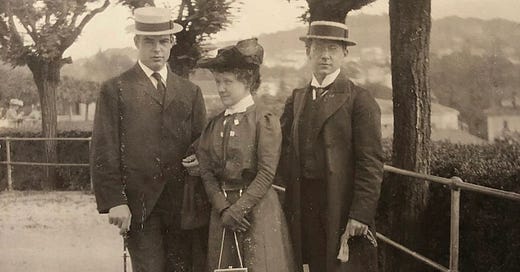You Have Not Seen Heathenism!
Borden's Response To Why He Would "Throw Himself Away as a Missionary"
The following excerpts are taken from Borden of Yale: No Reserve, No Retreat, No Regrets (BordenofYale.com), first published in 1926 (this edition 2024).
As the Millionaire Missionary prepared to depart for the field, one friend expressed surprise that he was “throwing himself away as a missionary”.
Borden’s reply?
“You have not seen heathenism.”
What was William Borden referencing? His primary exposure to “heathenism” had been on his round-the-world trip spanning 1904-1905. Here is just one example of the kind of heathenism that burdened Borden to the point where he was willing to leave everything behind (No Reserve!) to take the Gospel to the ends of the earth
In a letter to his mother, Borden writes on February 12, 1905:
Dr. Lucas came in on Friday from his camp. He goes to the country and visits villages throughout the week. He has been [on the mission field] thirty-four years and knows a thing or two. He told us that [a native official] had promised him an elephant to use at the Mela. So Saturday morning we started off for the Mela grounds.
Groups of women passed along the road chanting mournfully. All the pilgrims had the same sad expression on their faces—no trace of hope or happiness. They had been coming there and their ancestors before them, and yet were just as badly off as ever. But they keep on coming.
After some delay the elephant appeared and four of us clung to his back while he got on his feet, somewhat in the fashion of the camels at the World’s Fair. From the back of this creature we had a splendid view of the sea of turbaned heads. . .They would come up the slope until they saw the river and then prostrate themselves in the dust and hurry on. I noticed that the women were much more painstaking than the men, who often did not stop at all. We rode with our elephant through the throng to the river bank, where we saw the crowds in bathing. It was cold and some of the poor beggars nearly shook to pieces in their wet clothes. . .
At the road sides were crowds of beggars with all sorts of deformities. Dr. Lucas explained that they consider any deformity a mark of divine power and consequently a holy thing. There were so many of these that a poor pilgrim could hardly be expected to offer something to all. But they would walk down the line with a bag of rice and drop a few grains at each place. In this way small heaps of rice and other foodstuffs would collect in front of each one.
But the fakirs were the most interesting sight of all. I don’t believe I have attempted to describe a fakir. He wears nothing but a loin cloth; his body is smeared or painted with ash-dust in such a way that it never comes off, but remains a dull grey color; his hair is long, and from sprinklings of ashes and more sprinkling of water, it hangs like pieces of half-inch rope. There were about two dozen of these men, but not all of them were self-torturists. However, there were about ten, either sitting or lying on boards full of spikes. To be sure the spikes were somewhat blunted, but it must have been very uncomfortable until they got hardened to it.
There was one man sitting in a swing with one leg on the ground and his hands above his head. I noticed that his arms were very small and shrunken, and on inquiring we learned that he had held them up that way for seven years. The pain at first must have been frightful, but now he couldn’t get them down if he wanted to and can only move his hands a very little. I had never expected to see anything like this.




